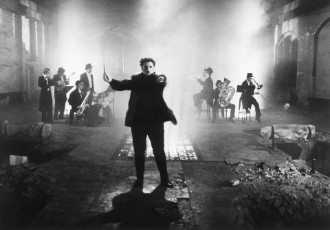
Solidarity Song: The Hans Eisler Story 1997
Distributed by Bullfrog Films, PO Box 149, Oley, PA 19547; 800-543-FROG (3764)
Produced by Rhombus Media
Directed by Larry Weinstein
VHS, color, 84 min.
Adult
Music, History
Date Entered: 11/09/2018
Reviewed by Brad Eden, Ph.D., Head, Web and Digitization Services, University Libraries, University of Nevada, Las VegasHanns Eisler has been considered one of the great composers of the twentieth century. He is, however, one of the least known. A devoted communist, he was persecuted throughout his life and rejected internationally. His associations, his music and humanistic convictions, and the explosive events of his life are portrayed in this documentary through the use of photography; film footage; interviews with friends, family members, and colleagues; live performances of his music; and readings from his writings.
Eisler was, from birth, a socialist. His father was a Jewish philosopher; his mother a Christian worker. He grew up in Vienna at the turn of the century, and studied music with Arnold Schoenberg, who himself counted Eisler as one of his three greatest students, along with Anton Webern and Alban Berg. Eisler's music, throughout his life, was dedicated to the people, the working class. In Berlin, Eisler work with Bertolt Brecht and Ernst Busch to produce plays and films that focused on the emancipation of the working class from governments of all kinds. When Hitler rose to power, Eisler emigrated to the United States, where he eventually wrote film music in Hollywood, including music for films like None But the Lonely Heart with Cary Grant, So Well Remembered, and The Spanish Main. He was friends with Charlie Chaplin, and loved being around people and parties, and was a heavy drinker. Brought before the House Committee on UnAmerican Activities after World War II, he was deported in 1947 for his communist viewpoints. He went back to East Germany, where he helped to rebuild and found the growing communist government there through his inspiring music, especially his National Anthem.
I highly recommend this film. It has already won numerous awards, including the Gemini Award for Best Sound, and the Gold Medal at the U.S. International Film and Video Festival. It is a wonderful montage of live musical performance, dramatic portrayal, film footage, and personal interviews concerning the life of one very important man. Despite about 5 minutes being cut off at the end of the film (which I hope that the distributors will correct before mass production), this film should be a part of any class dealing with the twentieth century, whether fine arts, history, or otherwise.